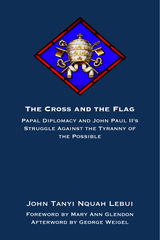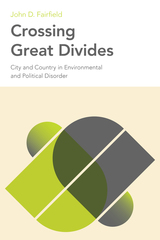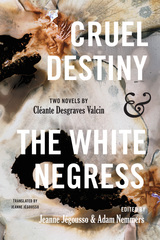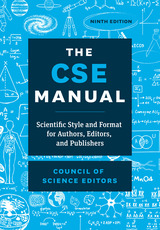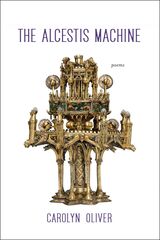
Inspired by the Greek myth of Alcestis, this poetry collection brings to life myriad voices who venture beyond the known world and exist between realities.
In Greek mythology, Alcestis descends to the mysterious kingdom of death in her beloved’s place. In The Alcestis Machine, Carolyn Oliver’s second poetry collection, loss and queer desire echo across the multiverse. “In another life, I’m a . . .” sea witch or swineherd, vampire or troubadour, florist or fossil or museum guard, Oliver writes. These parallel personas inhabit space stations and medieval villages, excavate the Devonian seabed, and plumb a subterranean Anthropocene. In possible futures and imagined pasts, they might encounter “all wrong turns and broken signs” or carry “a suitcase full of stars.”
Oliver’s poems are animated by lush, unsettling verse and forms both traditional and experimental. The Alcestis Machine demonstrates how very present absence can be and how desire knows no boundaries. In neighborhood subdivisions or the vast reaches of space, it’s impossible to know “whose time is slipping / again.” Anyone “could come loose / from gravity’s shine.”
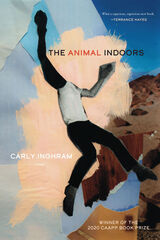
Carly Inghram’s poems explore the day-to-day experiences of a Black queer woman who is ceaselessly bombarded with images of mass-consumerism, white supremacy, and sexism, and who is forced, often reluctantly, back indoors and away from this outside chaos. The poems in The Animal Indoors seek to understand and define the boundaries between our inside and outside lives, critiquing the homogenization and increasing insincerity of American culture and considering what safe spaces exist for Black women. The speaker in these poems seeks refuge, working to keep the interior safe until we can reckon with the world outside, until the speaker is able to “unleash the indoor news onto the unclean water elsewhere.”
The Animal Indoors won the 2020 CAAPP Book Prize, selected by Terrance Hayes.
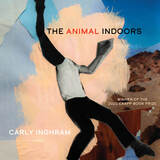
Carly Inghram’s poems explore the day-to-day experiences of a Black queer woman who is ceaselessly bombarded with images of mass-consumerism, white supremacy, and sexism, and who is forced, often reluctantly, back indoors and away from this outside chaos. The poems in The Animal Indoors seek to understand and define the boundaries between our inside and outside lives, critiquing the homogenization and increasing insincerity of American culture and considering what safe spaces exist for Black women. The speaker in these poems seeks refuge, working to keep the interior safe until we can reckon with the world outside, until the speaker is able to “unleash the indoor news onto the unclean water elsewhere.”
The Animal Indoors won the 2020 CAAPP Book Prize, selected by Terrance Hayes.

Seductive verse.
Ovid (Publius Ovidius Naso, 43 BC–AD 17), born at Sulmo, studied rhetoric and law at Rome. Later he did considerable public service there, and otherwise devoted himself to poetry and to society. Famous at first, he offended the emperor Augustus by his Ars amatoria, and was banished because of this work and some other reason unknown to us, and dwelt in the cold and primitive town of Tomis on the Black Sea. He continued writing poetry, a kindly man, leading a temperate life. He died in exile.
Ovid’s main surviving works are the Metamorphoses, a source of inspiration to artists and poets including Chaucer and Shakespeare; the Fasti, a poetic treatment of the Roman year of which Ovid finished only half; the Amores, love poems; the Ars amatoria, not moral but clever and in parts beautiful; Heroides, fictitious love letters by legendary women to absent husbands; and the dismal works written in exile: the Tristia, appeals to persons including his wife and also the emperor; and similar Epistulae ex Ponto. Poetry came naturally to Ovid, who at his best is lively, graphic and lucid.
The Loeb Classical Library edition of Ovid is in six volumes.


In bold tribute with a title utilizing the last two words Emily Dickinson wrote, Rosa Lane’s Called Back converses with one of our greatest poets in theatrical monologue—decoding secrets amid the blatant. Evoked by epigraphs selected from Dickinson’s work, Lane’s poems, through her I-speaker, reveal the extraordinary to be found in the ordinary and speak to the struggle of sexual orientation, otherness, and the challenges of living in a Calvinistic socioreligious world of oughts and noughts as evidenced in Dickinson’s poems. From sapphic eroticism and subsequent pangs of nonbelonging to tacking next life as a welcome reprieve, poems in Called Back create a de novo dot-connecting lyrical narrative.

Polymetric gems, wistful elegies, and a lover’s prayer.
Catullus (Gaius Valerius, 84–54 BC), of Verona, went early to Rome, where he associated not only with other literary men from Cisalpine Gaul but also with Cicero and Hortensius. His surviving poems consist of nearly sixty short lyrics, eight longer poems in various metres, and almost fifty epigrams. All exemplify a strict technique of studied composition inherited from early Greek lyric and the poets of Alexandria. In his work we can trace his unhappy love for a woman he calls Lesbia; the death of his brother; his visits to Bithynia; and his emotional friendships and enmities at Rome. For consummate poetic artistry coupled with intensity of feeling, Catullus’ poems have no rival in Latin literature.
Tibullus (Albius, ca. 54–19 BC), of equestrian rank and a friend of Horace, enjoyed the patronage of Marcus Valerius Messalla Corvinus, whom he several times apostrophizes. Three books of elegies have come down to us under his name, of which only the first two are authentic. Book 1 mostly proclaims his love for “Delia,” Book 2 his passion for “Nemesis.” The third book consists of a miscellany of poems from the archives of Messalla; it is very doubtful whether any come from the pen of Tibullus himself. But a special interest attaches to a group of them which concern a girl called Sulpicia: some of the poems are written by her lover Cerinthus, while others purport to be her own composition.
The Pervigilium Veneris, a poem of not quite a hundred lines celebrating a spring festival in honor of the goddess of love, is remarkable both for its beauty and as the first clear note of romanticism which transformed classical into medieval literature. The manuscripts give no clue to its author, but recent scholarship has made a strong case for attributing it to the early fourth-century poet Tiberianus.

In Country Songs for Alice, a nonbinary, queer narrator passes through the crucible of love, romance, and heartbreak against the backdrop of rural America—a landscape which offers luminous belonging, even as the hazards of homophobia, loneliness, and isolation loom large. Part roadtrip, part mixtape, these poems are explorations of love, music, romance, pageantry, loneliness, and belonging in the rural places and small towns that seem to preclude queer culture. Country Songs for Alice not only tells the story of a relationship and its dissolution but reclaims country western imagery and aesthetics for a queer audience, dousing the narrator’s experience in the language of cowboys, horses, rodeos, trucks, and desert skies.
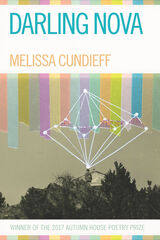

Learned love poems from the early Augustan age.
The passionate and dramatic elegies of Propertius gained him a reputation as one of Rome’s finest love poets. Here he portrays the exciting, uneven course of his love affair with Cynthia and tells us much about his contemporaries and the society in which he lives, while in later poems he turns to mythological themes and the legends of early Rome.
Born in Assisi about 50 BC, Propertius moved as a young man to Rome, where he came into contact with a coterie of poets, including Virgil, Tibullus, Horace, and Ovid. Publication of his first book brought immediate recognition and the unwavering support of Maecenas, the influential patron of the Augustan poets. He died perhaps in his mid-thirties, leaving us four books of elegies that have attracted admirers throughout the ages.
In this new edition of Propertius, G. P. Goold solves some longstanding questions of interpretation and gives us a faithful and stylish prose translation. His explanatory notes and glossary-index offer steady guidance and a wealth of information.
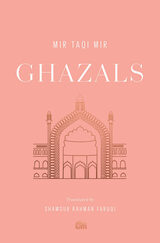
The finest ghazals of Mir Taqi Mir, the most accomplished of Urdu poets.
The prolific Mir Taqi Mir (1723–1810), widely regarded as the most accomplished poet in Urdu, composed his ghazals—a poetic form of rhyming couplets—in a distinctive Indian style arising from the Persian ghazal tradition. Here, the lover and beloved live in a world of extremes: the outsider is the hero, prosperity is poverty, and death would be preferable to the indifference of the beloved. Ghazals offers a comprehensive collection of Mir’s finest work, translated by a renowned expert on Urdu poetry.

A gathering of poetic blossoms.
The Greek Anthology contains some 4,500 short Greek poems in the sparkling and diverse genre of epigram, written by more than a hundred poets and collected over many centuries. To the original collection, called the Garland (Stephanus) by its contributing editor, Meleager of Gadara (first century BC), was added another Garland, by Philip of Thessalonica (mid-first century AD) and then a Cycle by Agathias of Myrina (AD 567/8). In about AD 900 these collections (now lost) and perhaps others (also lost, by Rufinus, Diogenianus, Strato, and Palladas) were partly incorporated and arranged into fifteen books according to subject by Constantine Cephalas; most of his collection is preserved in a manuscript called the Palatine Anthology. A second manuscript, the Planudean Anthology made by Maximus Planudes in 1301, contains additional epigrams omitted by Cephalas.
Outstanding among the poets are Meleager, Antipater of Sidon, Crinagoras, Palladas, Agathias, and Paulus Silentiarius.
This Loeb edition of The Greek Anthology replaces the earlier edition by W. R. Paton, with a Greek text and ample notes reflecting current scholarship. Volume I contains the following: Book 1. Christian Epigrams; Book 2. Description of the Statues in the Gymnasium of Zeuxippus; Book 3. Epigrams in the Temple of Apollonis at Cyzicus; Book 4. Prefaces to Various Anthologies; Book 5. Erotic Epigrams.

Noble verse.
The Greek poetry of the archaic period that we call elegy was composed primarily for banquets and convivial gatherings. Its subject matter consists of almost any topic, excluding only the scurrilous and obscene. In this completely new Loeb Classical Library edition, Douglas Gerber provides a faithful translation of the fragments and significant testimonia that have come down to us, with full explanatory notes.
Most substantial in this volume is the collection of elegiac verses to which Theognis’ name is attached. Drinking and merry-making are frequent themes in these poems; there are also more reflective and philosophic pieces and love poems. Together they offer an interesting picture of an aristocratic man’s views about life, friendship, fate, and daily concerns. Also notable in this volume is the martial verse of the Spartan Tyrtaeus and the poetry of Solon, Athens’ famous lawmaker.

Precious snippets of ancient song.
This volume contains the poetic fragments of the two illustrious singers of early sixth-century Lesbos: Sappho, the most famous woman poet of antiquity, whose main theme was love; and Alcaeus, poet of wine, war, and politics, and composer of short hymns to the gods. Also included are the principal testimonia, the ancients’ reports on the lives and work of the two poets.
The five volumes in the Loeb Classical Library edition of Greek Lyric contain the surviving fragments of solo and choral song. This poetry was not preserved in medieval manuscripts, and few complete poems remain. Later writers quoted from the poets, but only so much as suited their needs; these quotations are supplemented by papyrus texts found in Egypt, most of them badly damaged. The high quality of what remains makes us realize the enormity of our loss.
Volume I presents Sappho and Alcaeus. Volume II contains the work of Anacreon, composer of solo song; the Anacreontea; and the earliest writers of choral poetry, notably the seventh-century Spartans Alcman and Terpander. Stesichorus, Ibycus, Simonides, and other sixth-century poets are in Volume III. Bacchylides and other fifth-century poets are in Volume IV along with Corinna (although some argue that she belongs to the third century). Volume V contains the new school of poets active from the mid-fifth to the mid-fourth century and also collects folk songs, drinking songs, hymns, and other anonymous pieces.

Precious snippets of ancient song.
The five volumes in the Loeb Classical Library edition of Greek Lyric contain the surviving fragments of solo and choral song. This poetry was not preserved in medieval manuscripts, and few complete poems remain. Later writers quoted from the poets, but only so much as suited their needs; these quotations are supplemented by papyrus texts found in Egypt, most of them badly damaged. The high quality of what remains makes us realize the enormity of our loss.
Volume I presents Sappho and Alcaeus. Volume II contains the work of Anacreon, composer of solo song; the Anacreontea; and the earliest writers of choral poetry, notably the seventh-century Spartans Alcman and Terpander. Stesichorus, Ibycus, Simonides, and other sixth-century poets are in Volume III. Bacchylides and other fifth-century poets are in Volume IV along with Corinna (although some argue that she belongs to the third century). Volume V contains the new school of poets active from the mid-fifth to the mid-fourth century and also collects folk songs, drinking songs, hymns, and other anonymous pieces.

Precious snippets of ancient song.
The most important poets writing in Greek in the sixth century BC came from Sicily and southern Italy. Stesichorus was called by ancient writers “most Homeric”—a recognition of his epic themes and noble style. He composed verses about the Trojan War and its aftermath, the Argonauts, the adventures of Heracles. He may have been a solo singer, performing these poems to his own cithara accompaniment. Ibycus probably belonged to the colony of Rhegium in southwestern Italy. Like Stesichorus he wrote lyrical narratives on mythological themes, but he also composed erotic poems. Simonides is said to have spent his later years in Sicily. He was in Athens at the time of the Persian Wars, though, and was acclaimed for his epitaph on the Athenians who died at Marathon. He was a successful poet in various genres, including victory odes, dirges, and dithyrambic poetry. The power of his pathos emerges in the fragments we have.
All the extant verse of these poets is given in this third volume of David Campbell’s edition of Greek lyric poetry, along with the ancients’ accounts of their lives and works. Ten contemporary poets are also included, among them Arion, Lasus, and Pratinas.
The LCL edition of Greek Lyric is in five volumes. Sappho and Alcaeus—the illustrious singers of sixth-century Lesbos—are in the first volume. Volume II contains the work of Anacreon, composer of solo song; the Anacreontea; and the earliest writers of choral poetry, notably the seventh-century Spartans Alcman and Terpander. Bacchylides and other fifth-century poets are in Volume IV along with Corinna (although some argue that she belongs to the third century). The last volume includes the new school of dithyrambic poets (mid-fifth to mid-fourth century), together with the anonymous poems: drinking songs, children’s songs, cult hymns, and others.

Precious snippets of ancient song.
Bacchylides, nephew of Simonides and rival of Pindar, wrote choral poetry of many types. We have a number of his victory odes—poems celebrating victories in athletic contests—as well as dithyrambs and other hymns. He was a master of the captivating narrative. Also represented in this volume is the Boeotian Corinna, whose work, versions of local myths, survives in greater quantity than that of any other Greek woman poet except Sappho. Ancient authorities regarded Corinna as an older contemporary and mentor of Pindar; but some modern scholars place her later, in the third century BC. Other women are here too: Myrtis, also from Boeotia; Telesilla of Argos, famous for her military leadership as well as her hymns; the shadowy Charixena; and Praxilla of Sicyon, author of choral poems and drinking songs.
David Campbell gives all the extant verse of these poets, along with the ancients’ accounts of their lives and works. This fourth volume of his much-praised edition of Greek lyric poetry also includes Timocreon of Rhodes, pentathlete and writer of invective; Diagoras of Melos, choral poet and alleged atheist; and Ion of Chios. Sophocles is represented by fragments of his paean Asclepius, Euripides by the few surviving lines of his ode for Alcibiades’ dazzling victory in the chariot race at Olympia.
This is the fourth in a five-volume edition of Greek lyric poets. Sappho and Alcaeus, the illustrious singers of sixth-century Lesbos, are in the first. Volume II contains the work of Anacreon, composer of solo song; the Anacreontea; and the earliest writers of choral poetry, notably the seventh-century Spartans Alcman and Terpander. Stesichorus, Ibycus, Simonides, and other sixth-century poets are in Volume III. The last volume includes the new school of dithyrambic poets (mid-fifth to mid-fourth century), together with the anonymous poems: drinking songs, children’s songs, cult hymns, and others.

Precious snippets of ancient song.
Towards the end of the fifth century BC, Aristophanes and the other writers of comedy used contemporary poets and musicians as targets for their jokes, making fun of their innovations in language and music. The dithyrambs of Melanippides, Cinesias, Phrynis, Timotheus, and Philoxenus are remarkable examples of this new style. The poets of the new school, active from the mid-fifth to the mid-fourth century, are presented in this final volume of David Campbell’s widely praised edition of Greek lyric poetry. The longest piece extant is a nome by Timotheus—the foremost of these poets—called The Persians; it is a florid account of the battle of Salamis, to be sung solo to cithara accompaniment.
This volume also collects folk songs, drinking songs, and other anonymous pieces. The folk songs come from many parts of Greece and include children’s ditties, marching songs, love songs, and snatches of cult poetry. The drinking songs are derived mainly from Athenaeus’ collection of Attic scolia, short pieces performed at drinking parties in Athens. The anonymous pieces come from papyrus, vases, and stone as well as from literary texts, and include hymns, narrative poetry, and satirical writing.
This is the fifth in a five-volume edition of Greek lyric poets. Sappho and Alcaeus—the illustrious singers of sixth-century Lesbos—are in the first. Volume II contains the work of Anacreon, composer of solo song; the Anacreontea; and the earliest writers of choral poetry, notably the seventh-century Spartans Alcman and Terpander. Stesichorus, Ibycus, Simonides, and other sixth-century poets are in Volume III. Bacchylides and other fifth-century poets are in Volume IV along with Corinna (although some argue that she belongs to the third century).
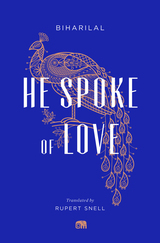
The seventeenth-century Hindi classic treasured for its subtle and beautiful portrayal of divine and erotic love’s pleasures and sorrows.
The seven hundred poems of the Hindi poet Biharilal’s Satsai weave amorous narratives of the god Krishna and the goddess Radha with archetypal hero and heroine motifs that bridge divine and worldly love. He Spoke of Love brims with romantic rivalries, clandestine trysts, and the bittersweet sorrow of separated lovers. This new translation presents four hundred couplets from the enduring seventeenth-century classic, showcasing the poet’s ingenuity and virtuosity.

Two early works by the consummate Latin love poet.
Ovid (Publius Ovidius Naso, 43 BC–AD 17), born at Sulmo, studied rhetoric and law at Rome. Later he did considerable public service there, and otherwise devoted himself to poetry and to society. Famous at first, he offended the emperor Augustus by his Ars amatoria, and was banished because of this work and some other reason unknown to us, and dwelt in the cold and primitive town of Tomis on the Black Sea. He continued writing poetry, a kindly man, leading a temperate life. He died in exile.
Ovid's main surviving works are the Metamorphoses, a source of inspiration to artists and poets including Chaucer and Shakespeare; the Fasti, a poetic treatment of the Roman year of which Ovid finished only half; the Amores, love poems; the Ars amatoria, not moral but clever and in parts beautiful; Heroides, fictitious love letters by legendary women to absent husbands; and the dismal works written in exile: the Tristia, appeals to persons including his wife and also the emperor; and similar Epistulae ex Ponto. Poetry came naturally to Ovid, who at his best is lively, graphic and lucid.
The Loeb Classical Library edition of Ovid is in six volumes.
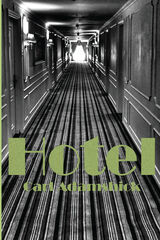
Adamshick’s poems are characteristically accessible and navigable. From the political to the erotic and everywhere in between, these poems take us on a sometimes sober, sometimes raunchy ride.
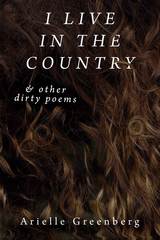
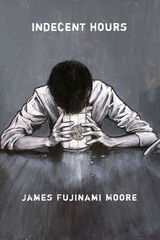
For award-winning poet James Fujinami Moore, the past is never past. In this brutal debut, sensual, political, and imagined worlds collide, tracing a history of diaspora and trauma that asks: what do we do in the aftermath of violence, and why do we long to inflict it? From Vegas boxing rings and the restless sands of Manzanar to the scrolling horrors of a Facebook feed, Moore’s poems trace over intimate details with surprising humor, fierce eroticism, and a restless eye.


Part memoir, part imagined history, this unique personal essay depicts the intimate experience of childhood bereavement, lost love affairs, and the complicated realities of motherhood and marriage. Framed by an extended train journey, author Sophie Ratcliffe turns to the novels, novelists, and heroines who have shaped her emotional and romantic landscapes. She transports us with her to survey the messiness of everyday life, all while reflecting on steam propulsion and pop songs, handbags and honeymoons, Anna Karenina and Anthony Trollope, former lovers and forgotten muses. Frank, funny, tender, and transporting, Loss, A Love Story asks why we fall in, and out, of love—and how we might understand doing so amid the ongoing upheavals and unwritten futures of the twenty-first century.

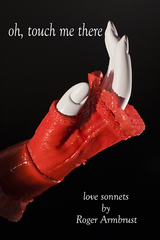
Witty, humorous and wise reflections on loving
There is a mythic quality to the poetry of Roger Armbrust. Whether his subject is surgery or angels, his language and vision—while expressed in an earthly lexicon—are focused on the life of the spirit.
We constantly heal each other, love, true
to our senses, sharing our secret vaults
of fear and longing, faith and confusion,
doubt and delight.
Armbrust’s love poems are not ethereal, however, but rooted in real bodies…
My poetry honors your architecture’s mystery.
Fanciful, yet rooted in real experience, Armbrust’s one hundred-plus sonnets incite passion and introspection, so that the collection makes an inspired lover’s gift.

PLEASURE is a book-length poem which muses on the phenomenology of solitude in a pastoral landscape, written in a diaristic, lyric mode, where the queer “I” alternately savors the decadence of isolation and stands at the precipice of despair. A travelogue in verse, PLEASURE takes place in Syros, the Greek island to which author Angelo Nikolopolous travels a few weeks after the discovery of his mother’s brain tumor. These intertextual, elliptical explorations of solitude and sensuality interweave images of seaside roaming, secluded town life, and ephemeral sexual encounters with the ubiquitous implication of death—the waning summer, the ill, perhaps dying, mother. Staring down true disconnection—both physical and psychic orphanhood —Nikolopoulos writes about the thrill and sadness of turning your back against the world and those in it only to rediscover that which tethers all to human experience: the quotidian, singular pleasures of having a body.

The seventeenth-century Hindi classic treasured for its subtle and beautiful portrayal of divine and erotic love’s pleasures and sorrows.
In his Satsai, or Seven Hundred Poems, the seventeenth-century poet Biharilal draws on a rich vernacular tradition, blending amorous narratives about the god Krishna and the goddess Radha with archetypal hero and heroine motifs from older Sanskrit and Prakrit conventions. While little is known of Biharilal’s life beyond his role as court poet to King Jai Singh of Amber (1611–1667), his verses reflect deep knowledge of local north Indian culture and geography, especially the bucolic landscapes of Krishna’s youth in the Braj region (in today’s Uttar Pradesh). With ingenuity and virtuosity, Biharilal weaves together worldly experience and divine immanence, and adapts the tropes of stylized courtly poetry, such as romantic rivalries, clandestine trysts, and the bittersweet sorrow of separated lovers.
Poems from the Satsai comprises a selection of four hundred couplets from this enduring work. The Hindi text—composed in Braj Bhasha, the literary language of early-modern north India—is presented here in the Devanagari script and accompanies a new English verse translation.
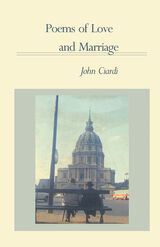
Collected from his published and heretofore unpublished work, the love poems of John Ciardi in Poems of Love and Marriage are a rich display of gentle wit, emotion, and craft. Not merely lyrics of youthful romance, these span the course of a love affair, of a life shared from first blush to old age.
These poems never disturb the sanctity of the private moment, but transcend the specific situation and bloom into universal recognition. And in his usual way of basking in those qualities which transform the ordinary into the unique, John Ciardi finds poignancy and truth in those elements of love and living together that so often go unnoticed.
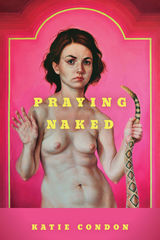

The finest ghazals of Mir Taqi Mir, the most accomplished of Urdu poets.
Mir Muhammad Taqi Mir (1723–1810) is widely regarded as the most accomplished poet in the Urdu language. His massive output—six divans—was produced in Delhi and Lucknow during the high tide of Urdu literary culture.
Selected Ghazals and Other Poems offers a comprehensive collection of Mir’s finest ghazals, extended lyrics composed of couplets, and of his masnavis, narrative works of a romantic or didactic character. The ghazals celebrate earthly and mystical love through subtle wordplay, vivid descriptions of the beloved, and a powerful individual voice. The sometimes satirical masnavis highlight everyday subjects: domestic pets, monsoon rains, the rigors of travel. They also include two astonishing love stories: one about young men whose relationship is shattered when one marries; the other about a queen, her peacock lover, and the jealous king who seeks to drive them apart.
The Urdu text, presented here in the Nastaliq script, accompanies new translations of Mir’s poems, some appearing in English for the first time.
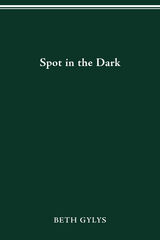

The literary jewel of Telegu civilization, translated for the first time into any language.
Manucaritramu, or The Story of Manu, by the early sixteenth-century poet Allasani Peddana, is the definitive literary monument of Telugu civilization and a powerful embodiment of the imperial culture of Vijayanagara, the last of the great premodern south Indian states. It is the story of Svarochisha Manu, who ruled over the previous cosmic age and who serves here as prototype for the first human being. Peddana explores the dramatic displacements, imaginative projections, and intricate workings of desire necessary for Manu’s birth and formation. The Story of Manu is also a book about kingship and its exigencies at the time of Krishnadevaraya, the most powerful of the Vijayanagara rulers, who was a close friend and patron of the poet.
The Story of Manu, presented in the Telugu script alongside the first translation into any language, is a true masterpiece of early modern south Indian literature.
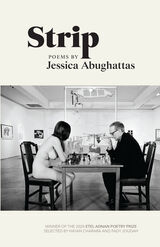
“The mystery that Abughattas composes is always moving toward an impossible freeing of the self from its numerous frames. Yet frame by frame . . . she suspends our disbelief, catalogs those potentialities in an America always ready to shoot, direct, and produce the film of itself. Strip is ‘in love with possibility,’ ‘in praise of here I am, here I’ve been,’ USA style. Strip celebrates the body—its rise and fall, ebb and flow, in a carnival of parties—restlessly, shamelessly, searching for a way out…. Even as Abughattas claims that ‘I can’t believe sometimes I have a body,’ her poems teem with an awareness of the body’s unavoidable centrality in our lives—in how we view our lives, and how others view them; in how they progress, and how they end; in how they become meaningful, and how they are stripped of meaning. And no stripping escapes memory. Whether in terms of dispossession or sexuality, admiration or pity, Abughattas renders her treatment of the body with candor and poignancy. . . . The most startling moments in Abughattas’s poems, however, depend not on shocking or intimate details—but on the ‘I’ pulling away from the self, abandoning the ego, and gazing outward. She tries to see something else, to escape the body’s restraints.”
—Fady Joudah and Hayan Charara, from the Preface
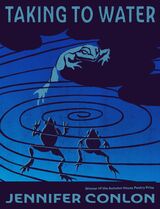
A tender imagining and devastating reckoning, Jennifer Conlon’s debut presents a poetry collection of gender questioning, concerned with the survival of trans and nonbinary kids who live in places that do not allow them to thrive. The speaker of these poems wrestles with and envisions a life beyond their traumatic childhood as a genderqueer child in a small Southern Bible Belt town. Through retelling and reinterpreting moments of sexual shame and religious oppression, while navigating impossible expectations from a gender-binary society, Conlon shows readers that queerness and the natural world are inseparable. In their poems, Conlon comes to reject oppressive patriarchal figures, turning their gaze toward the natural world that catalyzes dreams of possibility, transformation, and safety—wasps protect them, an oak tree contains a new god, and flathead catfish guide them to a newly imagined body. Through thick North Carolina woods, Conlon searches for a language to celebrate queerness, finding it in ponds, hillsides, and within themselves.
Taking to Water was selected by Carl Phillips as the winner of the 2022 Autumn House Poetry Prize.
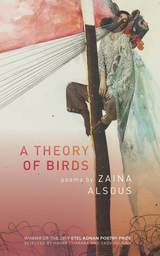
Winner of the 2019 Etel Adnan Poetry Prize
Inside the dodo bird is a forest, Inside the forest
a peach analog, Inside the peach analog a woman, Inside
the woman a lake of funerals
This layering of bird, woman, place, technology, and ceremony, which begins this first full-length collection by Zaina Alsous, mirrors the layering of insights that marks the collection as a whole. The poems in A Theory of Birds draw on inherited memory, historical record, critical theory, alternative geographies, and sharp observation. In them, birds—particularly extinct species—become metaphor for the violences perpetrated on othered bodies under the colonial gaze.
Putting ecological preservation in conversation with Arab racial formation, state vernacular with the chatter of birds, Alsous explores how categorization can be a tool for detachment, domination, and erasure. Stretching their wings toward de-erasure, these poems—their subjects and their logics—refuse to stay put within a single category. This is poetry in support of a decolonized mind.
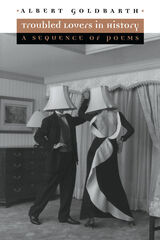
Troubled Lovers in History demonstrates an exhilarating range: from the briefest of lyrics to rich and multipartite narrative adventures in exotic realms; from a comic monologue spoken in immigrant “Yinglish” to a soulful elegy set in San Antonio’s Pearl Beer brewery plant; from Martian invaders, through polar explorers, to all of us busy inflicting “words with edges” on those we love.
Goldbarth sets his unflinching study of individual hope and grief against the backdrop of history: the travels of Marco Polo; Bertha and Wilhelm Rontgen’s discovery of X-rays; an 1800 battle “twixt Dragon Sam, the great Exhaler of Gouts of Amazing Flame . . . and Liquid Dan, the Living Geyser.”
From the night stars to the little starring parts we all play every day, Troubled Lovers in History takes us into the text of our dreams and despairs, as witnessed by the writer whom Joyce Carol Oates called “a poet of remarkable gifts—a dazzling virtuoso who can break your heart.”
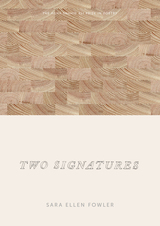

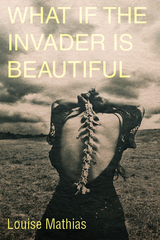
What if the Invader is Beautiful explores the ineffable yet primal connections between outer and inner landscapes — the impact that the natural world has on the psychological terrain of our interior lives. Through compressed, musical, and often deeply mysterious language, the poems enact the extreme outer limits of emotional experience. Often set in equally extreme natural settings, the poems ride the knife edge between beauty and terror — exploring concepts of the sublime, the spiritual power of the elements, the redemptive beauty of flora and fauna, and the psychological freedom of wide-open spaces — and illuminate how deepening our connection to these elements is ultimately what will save us from our human afflictions of separation, isolation, and fear.
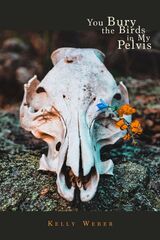
Set against a rural plains landscape of gas stations, wind, and roadkill bones littering the highways, You Bury the Birds in My Pelvis is a love letter to the nonbinary body as a site of both queer platonic intimacy and chronic illness. Looking at art and friendship, Kelly Weber’s poems imagine alternatives to x-rays, pathologizing medical settings, and other forms of harm. Considering the meeting place of radiological light and sunlit meadows, the asexual speaker’s body, and fox skeletons, these poems imagine possible forms of love. With the body caught in medical crisis and ecological catastrophe, Weber questions how to create a poetry fashioned both despite and out of endings.
You Bury the Birds in My Pelvis explores forms with plainspoken prose poems with a mix of short poems and longer lyric sections that navigate insurance systems and complicated rural relationships to queerness.
You Bury the Birds in My Pelvis is the winner of the 2022 Omnidawn 1st/2nd Poetry Book Contest, chosen by Mary Jo Bang.
READERS
Browse our collection.
PUBLISHERS
See BiblioVault's publisher services.
STUDENT SERVICES
Files for college accessibility offices.
UChicago Accessibility Resources
home | accessibility | search | about | contact us
BiblioVault ® 2001 - 2024
The University of Chicago Press



